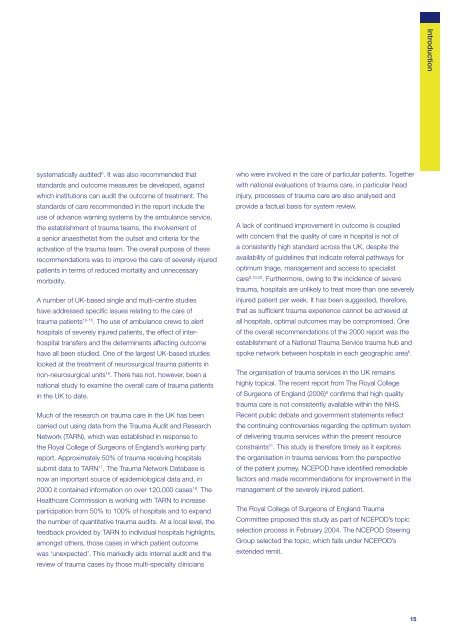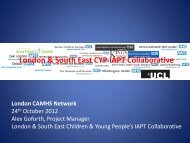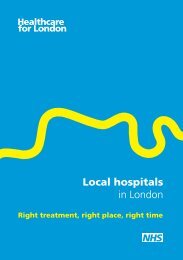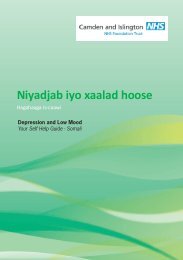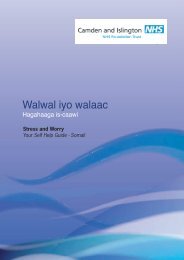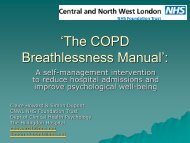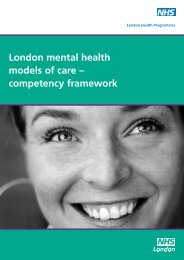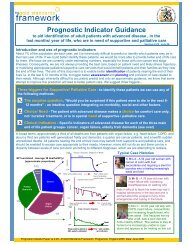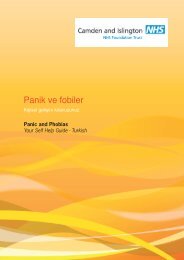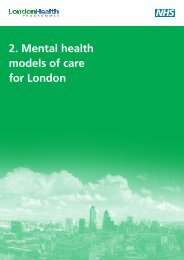NCEPOD: Trauma - Who Cares? - London Health Programmes
NCEPOD: Trauma - Who Cares? - London Health Programmes
NCEPOD: Trauma - Who Cares? - London Health Programmes
Create successful ePaper yourself
Turn your PDF publications into a flip-book with our unique Google optimized e-Paper software.
Introductionsystematically audited 6 . It was also recommended thatstandards and outcome measures be developed, againstwhich institutions can audit the outcome of treatment. Thestandards of care recommended in the report include theuse of advance warning systems by the ambulance service,the establishment of trauma teams, the involvement ofa senior anaesthetist from the outset and criteria for theactivation of the trauma team. The overall purpose of theserecommendations was to improve the care of severely injuredpatients in terms of reduced mortality and unnecessarymorbidity.A number of UK-based single and multi-centre studieshave addressed specifi c issues relating to the care oftrauma patients 10-15 . The use of ambulance crews to alerthospitals of severely injured patients, the effect of interhospitaltransfers and the determinants affecting outcomehave all been studied. One of the largest UK-based studieslooked at the treatment of neurosurgical trauma patients innon-neurosurgical units 16 . There has not, however, been anational study to examine the overall care of trauma patientsin the UK to date.Much of the research on trauma care in the UK has beencarried out using data from the <strong>Trauma</strong> Audit and ResearchNetwork (TARN), which was established in response tothe Royal College of Surgeons of England’s working partyreport. Approximately 50% of trauma receiving hospitalssubmit data to TARN 17 . The <strong>Trauma</strong> Network Database isnow an important source of epidemiological data and, in2000 it contained information on over 120,000 cases 18 . The<strong>Health</strong>care Commission is working with TARN to increaseparticipation from 50% to 100% of hospitals and to expandthe number of quantitative trauma audits. At a local level, thefeedback provided by TARN to individual hospitals highlights,amongst others, those cases in which patient outcomewas ‘unexpected’. This markedly aids internal audit and thereview of trauma cases by those multi-specialty clinicianswho were involved in the care of particular patients. Togetherwith national evaluations of trauma care, in particular headinjury, processes of trauma care are also analysed andprovide a factual basis for system review.A lack of continued improvement in outcome is coupledwith concern that the quality of care in hospital is not ofa consistently high standard across the UK, despite theavailability of guidelines that indicate referral pathways foroptimum triage, management and access to specialistcare 6,19,20 . Furthermore, owing to the incidence of severetrauma, hospitals are unlikely to treat more than one severelyinjured patient per week. It has been suggested, therefore,that as suffi cient trauma experience cannot be achieved atall hospitals, optimal outcomes may be compromised. Oneof the overall recommendations of the 2000 report was theestablishment of a National <strong>Trauma</strong> Service trauma hub andspoke network between hospitals in each geographic area 6 .The organisation of trauma services in the UK remainshighly topical. The recent report from The Royal Collegeof Surgeons of England (2006) 6 confi rms that high qualitytrauma care is not consistently available within the NHS.Recent public debate and government statements refl ectthe continuing controversies regarding the optimum systemof delivering trauma services within the present resourceconstraints 21 . This study is therefore timely as it exploresthe organisation in trauma services from the perspectiveof the patient journey. <strong>NCEPOD</strong> have identifi ed remediablefactors and made recommendations for improvement in themanagement of the severely injured patient.The Royal College of Surgeons of England <strong>Trauma</strong>Committee proposed this study as part of <strong>NCEPOD</strong>’s topicselection process in February 2004. The <strong>NCEPOD</strong> SteeringGroup selected the topic, which falls under <strong>NCEPOD</strong>’sextended remit.15


